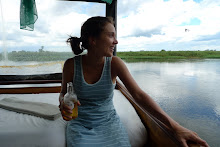I’ve written before about people seeing what they want to see (though I had been writing about how people see me), and I was struck again today by how much I think that is true, or more precisely, how much I think people see what they expect to see. Not that there is some inherently “true” way of seeing, but it never ceases to amaze me how peoples’ preconceived notions (or here I think it’s fair to say their prejudices) really color how they interpret a situation, a person or group of people.
The Coffee Shop in Kasane is a bastion of expatriateness but I can’t stay away—the blueberry muffins and quiche are just too good and they make a half-way decent cappuchino. It’s a good place for me to set up shop and work on my computer, check email (wireless!), eat lunch, sip coffee and bask in the air con. Plus woman who owns the places is quite sweet to me and treats me to a complimentary dessert now and then. However, I have never seen a Motswana eating inside and the chatter around me can often border on the ridiculous.
Today I had my research assistants come into town so we could have a power meeting about their progress on the survey work they are running in the village. Since I’m in town now doing my own set of interviews, it can be a little tricky to manage them from afar, but so far Prince (my main research assistant), seems to be doing a good job of keeping things on track. In fact, he is definitely the most capable, competent, and responsible of all my past and current research assistants. For lack of a better meeting spot, I decided we would rendez-vous at the coffee shop’s outdoor seating. Over glasses of juice, he was his usual self—joking around quite a bit but quick on his feet when it came to providing me with both answers when I grilled him about missing survey pages, and ideas when I brought up the subject of planning the thank-you village parties.
Which is why I was totally thrown off when I walked inside the coffee shop after our meeting ended (getting ready to order a delicious panini for myself) to face a sympathetic-looking smile from the coffee shop owner. “Ooh looks like you were having a tough time of it out there”, she commented. I must have looked confused because she followed it up with, “I could see your helper slouching in his chair”—and here she did the typical expat impersonation of a Motswana, which involves trying to look as lazy and useless as possible—“and just looking off in all directions into space.” Usually I let the embarrassingly racist jokes and imitations slide, but given that she was just so off the mark about Prince, I felt like I had to say something. “Well actually he is really great, and very much on top of things—in fact with him at the healm I feel not too worried about leaving the survey portion of my research to run on its own in the village while I do my interviews in town.” Her eyebrows arched and she didn’t have much to say besides, “oh really? Because it looked like he was just lolligaging about over there” (sidenote: I didn’t know anyone else besides my mom used this phrase, apparently it made its way over from England to former Rhodesia back in the day). “No he is really a great assistant”, I inarticulately reiterated again, and the conversation had nowhere else to go.
I took her recommendation of the daily special (chicken and mushroom pie), still bewildered and reeling from wondering how on earth she could have interpreted the scene outside the way she did. On a literal level, Prince was not even remotely “lounging” in his chair, and if she had stopped for just a second to listen to a word of the conversation, it seems impossible to think that she would have been so dead wrong in her impression of him. But maybe she still would have seen things that way. Maybe, I wonder, she is so accustomed to thinking of the “locals” in a certain light that she now sees what she expects to see, not what actually is in front her—in this case, a smart, well-spoken and charismatic young man. Whose name happens to be Prince.




